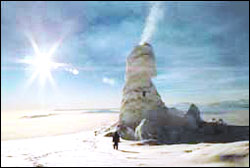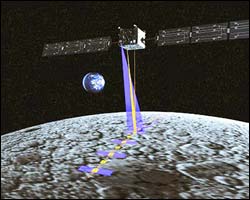Contrary to popular belief, using the Internet may not improve a person’s chances of finding a job.
That surprising finding will be presented Tuesday (Aug. 18) during a session on economic sociology at the annual meeting of the American Sociological Association in Atlanta by Christine Fountain, a University of Washington doctoral student.
“The punch line is everyone thinks the Internet is a great new way to help people find a job. But it really is not,” said Fountain,
ESA’s Mars Express is due to arrive at Mars in December 2003, and its Beagle 2 lander will be making a touchdown in the middle of the Martian winter. Will it see a ’’white Christmas’’ on the Red Planet? Also, if humans one day go to Mars, would they need to take a sunscreen?
Over its four-year lifetime, Mars Express will be returning data to refine the latest computer models of the Martian climate. It will be closely watching the clouds, fog, dust devils, and storms,
Using a new approach for dissecting the complicated interactions among many genes, scientists at Dana-Farber Cancer Institute have discovered how a common cancer gene works in tandem with another gene to spur the unchecked growth of cells. The researchers say the technique was so useful in solving a longstanding puzzle that it may expedite the discovery of other such gene interactions that lead to cancer, and could accelerate the development of new cancer drugs.
The report in the Aug

Giant hollow towers of ice formed by steaming volcanic vents on Ross Island, Antarctica are providing clues about where to hunt for life on Mars.
University of Melbourne geologist, Dr Nick Hoffman has found evidence from recent infra-red images of Mars that similar structures may exist on Mars and, if life is to be found, such towers may be best place to start looking.
Hoffman has drawn attention to strange temperature anomalies in these latest Mars images taken with an inf

This is clearly Europe´s time for interplanetary exploration. Having sent the first European mission to Mars, ESA is about to launch its first probe to the Moon. It is called SMART-1 and its goals are both technological and scientific. It is the first of a series of “Small Missions for Advanced Research in Technology”.
On the one hand, SMART-1 will test new state-of-the art instruments and techniques essential to ambitious future interplanetary missions, such as a solar-electric prim
The search for life on other planets could soon extend to solar systems that are very different from our own, according to a new study by an Ohio State University astronomer and his colleagues.
In fact, finding a terrestrial planet in such a solar system would offer unique scientific opportunities to test evolution, said Andrew Gould, professor of astronomy here. In a recent issue of Astrophysical Journal Letters, he and his coauthors calculated that NASA’s upcoming Space Interferome